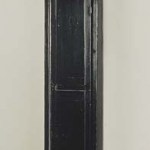New World
However time may be measured at the Naval Observatory, the clock seems to tick slowly here when Congress is out of town. -Richard Corrigan
The following is the mostly true (but somewhat fictionalized) story of the first clocks in the Americas. In the 17th Century, the finest clockmakers in the world were Dutch, going back to the time of Christiaan Huygens.
Image: A Dutch Longcase clock, courtesy of The Museum of the Dutch Clock.
Huygens determined that if you allowed a pendulum to swing just a little bit, the period of its swing could be used to keep time to incredible accuracy. By the mid-…
A new paper in PLoS ONE, Evaluation of Group Genetic Ancestry of Populations from Philadelphia and Dakar in the Context of Sex-Biased Admixture in the Americas, doesn't add much to what we know. They looked at a several hundred individuals who are self-identified as African American and European American, as well as 49 Senegalese from Dakar. Additionally, they reanalyzed data from Latin America from whites and blacks in Brazil, as well as a group of mixed Cubans. They found what you might expect to find, African and Native ancestry shows a female bias, European ancestry shows a male bias.
But…
Haplotypic Background of a Private Allele at High Frequency in the Americas:
Recently, the observation of a high-frequency private allele, the 9-repeat allele at microsatellite D9S1120, in all sampled Native American and Western Beringian populations has been interpreted as evidence that all modern Native Americans descend primarily from a single founding population. However, this inference assumed that all copies of the 9-repeat allele were identical by descent and that the geographic distribution of this allele had not been influenced by natural selection. To investigate whether these…
